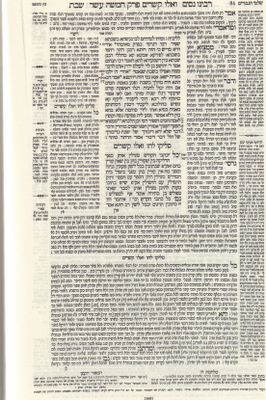
HIDE/SHOW IMAGE
42b
{Shabbat 113b continues, but first a slight digression}
And however, to run to shul on Shabbat is fine, for we learn in perek meEmatai {Brachot 6a}:
Rabbi Zera said: Initially, when I saw Sages running on Shabbat to learn, I believed that these Sages were desecrating the Shabbat. Once I heard this statement of Rabbi Tanchum, citing Rabbi Yochanan, that one should always run to perform a mitzvah, even on Shabbat, for it is stated {in Hoshea 11:10}:
{Shabbat 113b}
Rav Huna said:If one is walking on Shabbat and comes to a stream of water, if he can put down his first foot before lifting the second {that is, he can cross it in a single stride},it is permitted; otherwise it is forbidden {even to jump across}.
Rava objected to this: What shall he do? Shall he go round it? Then he increases the walking [distance] {which is more tiring and thus not more preferable}! Shall he cross it [walking through]? His garments may be soaked in water and he is led to wringing [them] out! Rather [in such a case], since it is impossible [otherwise], he should make a large stride and jump over the stream of water, and it is fine.
And so is the halacha.
{Shabbat 113a}
{We had earlier cited Yeshaya 58:13:
יג אִם-תָּשִׁיב מִשַּׁבָּת רַגְלֶךָ, עֲשׂוֹת חֲפָצֶךָ בְּיוֹם קָדְשִׁי; וְקָרָאתָ לַשַּׁבָּת עֹנֶג, לִקְדוֹשׁ יְהוָה מְכֻבָּד, וְכִבַּדְתּוֹ מֵעֲשׂוֹת דְּרָכֶיךָ, מִמְּצוֹא חֶפְצְךָ וְדַבֵּר דָּבָר.
}If thou turn away thy foot because of the sabbath, from pursuing thy business on My holy day; and call the sabbath a delight, the holy of the LORD, honourable; and shalt honour him, not doing thine own ways, nor finding thine own pleasure, nor speaking thine own words:
מִמְּצוֹא חֶפְצְךָ - nor finding thine own pleasure {lit. matters} - your matters are forbidden, but the matters of Heaven are permitted. {Rashi: such as allotment of tzedaka and arranging marriages for girls.}
וְדַבֵּר דָּבָר - nor speaking thine own words - that your speech on Shabbat should not be as your speech during the week.
דָּבָר - speech is forbidden, but thinking about it is permitted.
END PEREK FIFTEEN
BEGIN PEREK SIXTEEN
{Shabbat 115a}
MISHNA:
ALL SACRED WRITINGS {=Tanach} MAY {=must} BE SAVED FROM A FIRE {by moving them from one domain to another}, WHETHER WE READ THEM {in public gatherings - Ketuvim are not read during the Torah readings or Haftara.} OR NOT; AND EVEN IF THEY ARE WRITTEN IN ANY LANGUAGE, THEY MUST BE HIDDEN {if they become unfit for use}.
AND WHY DO WE NOT READ [CERTAIN OF THE SACRED WRITINGS]? BECAUSE OF THE NEGLECT OF THE BETH HAMIDRASH. {for the public lectures would be neglected}
{Shabbat 116b}
ONE MAY SAVE THE SHEATH OF A SCROLL TOGETHER WITH THE SCROLL, AND THE CONTAINER OF TEFILLIN TOGETHER WITH THE TEFILLIN, EVEN IF IT [ALSO] CONTAINS MONEY. AND WHITHER MAY WE RESCUE THEM? INTO A CLOSED ALLEY; BEN BATHYRA RULED: EVEN INTO AN OPEN ONE.
{Shabbat 115a}
Gemara:
"ALL SACRED WRITINGS...":
It was stated {by Amoraim}:
If they are written in Targum {Aramaic translation} or in any [other] language:
Rav Huna said:



No comments:
Post a Comment